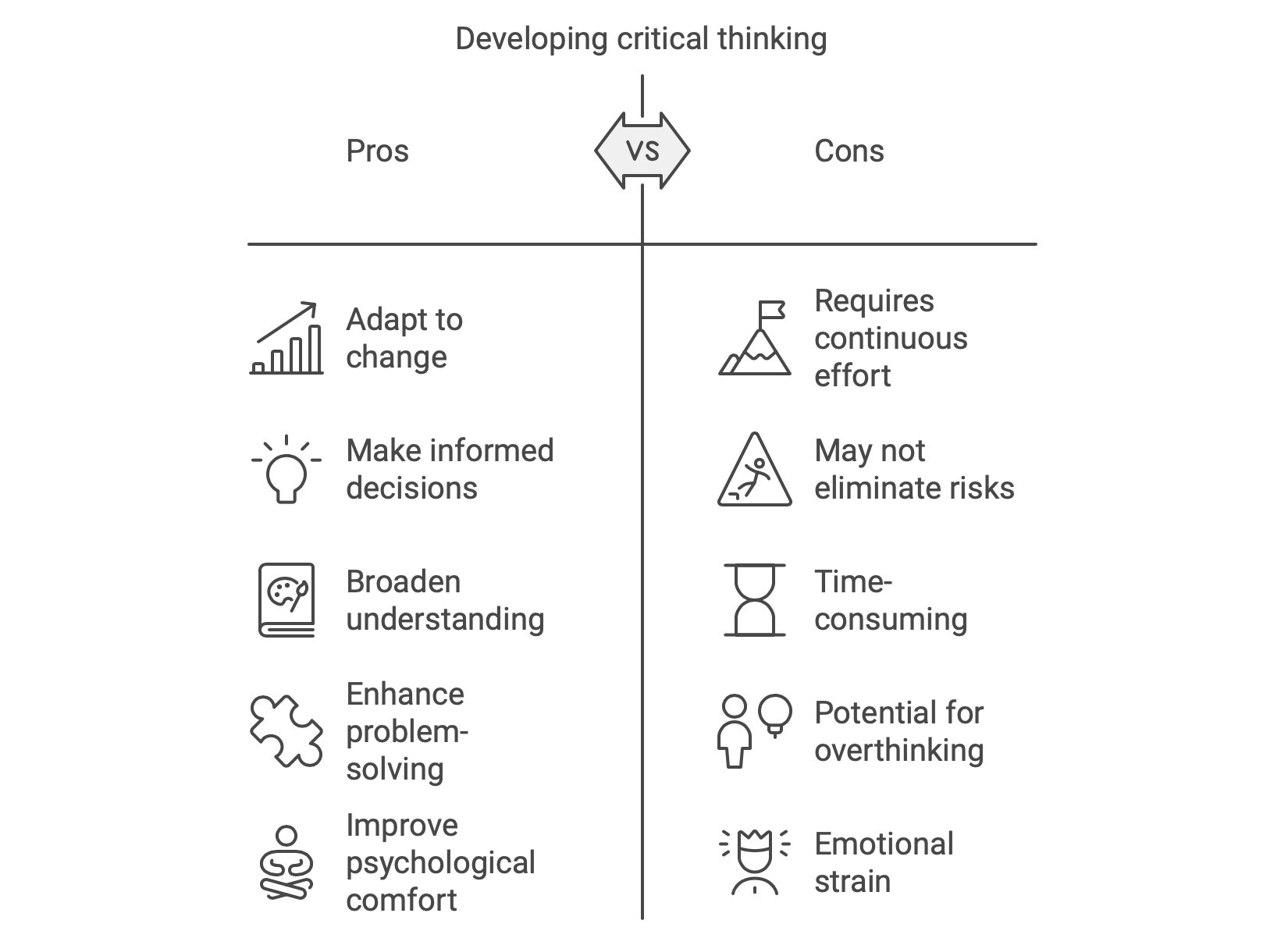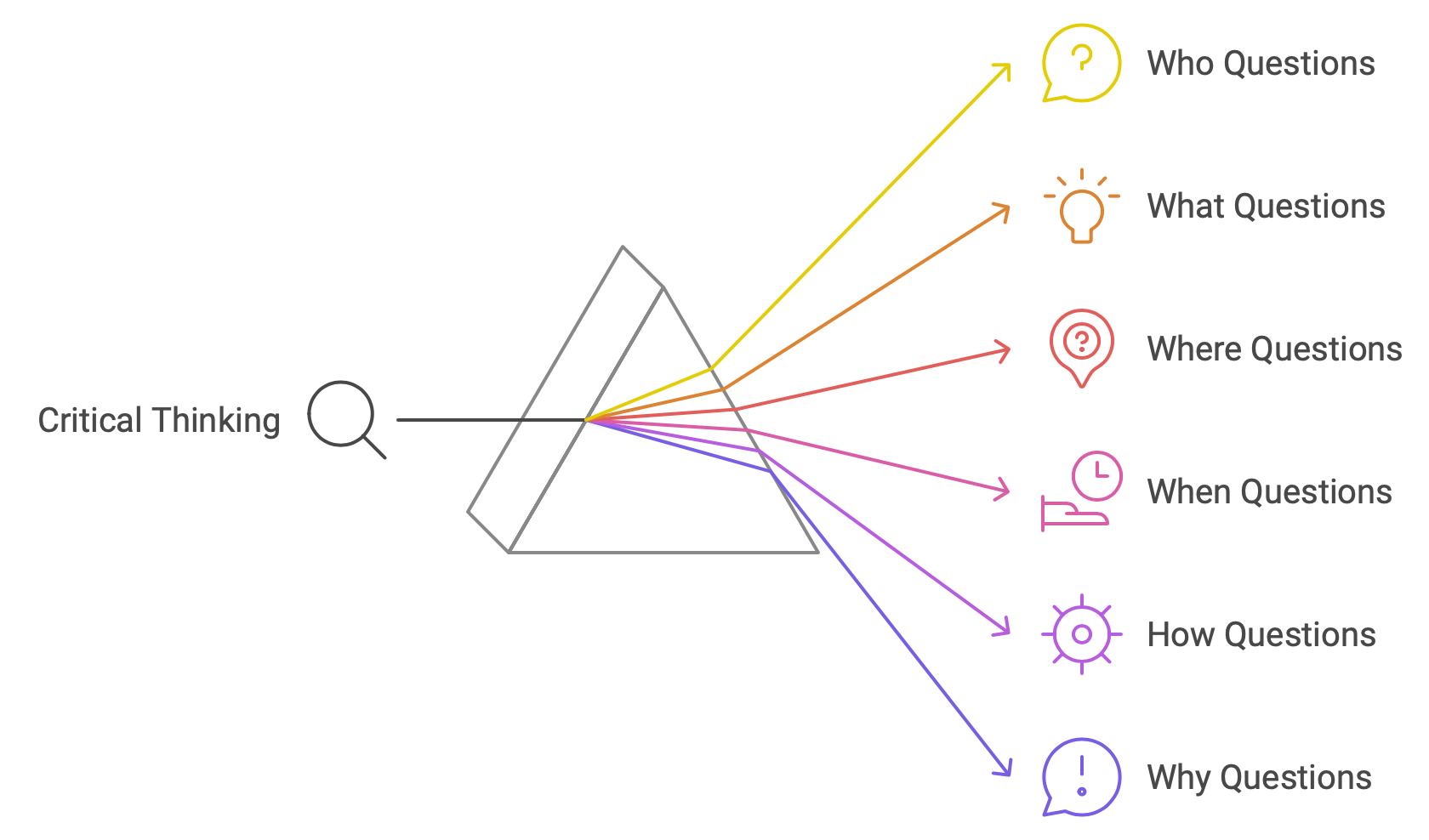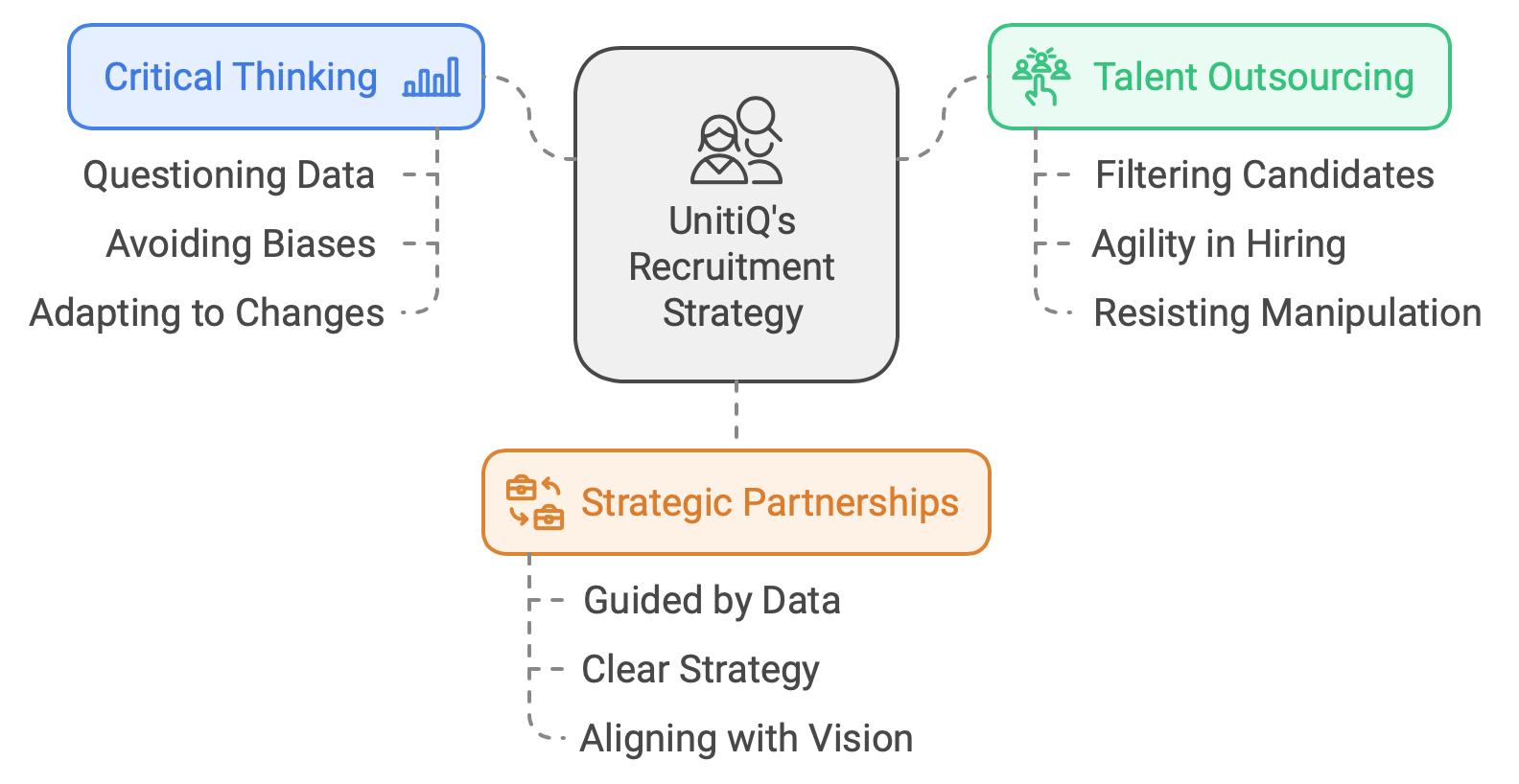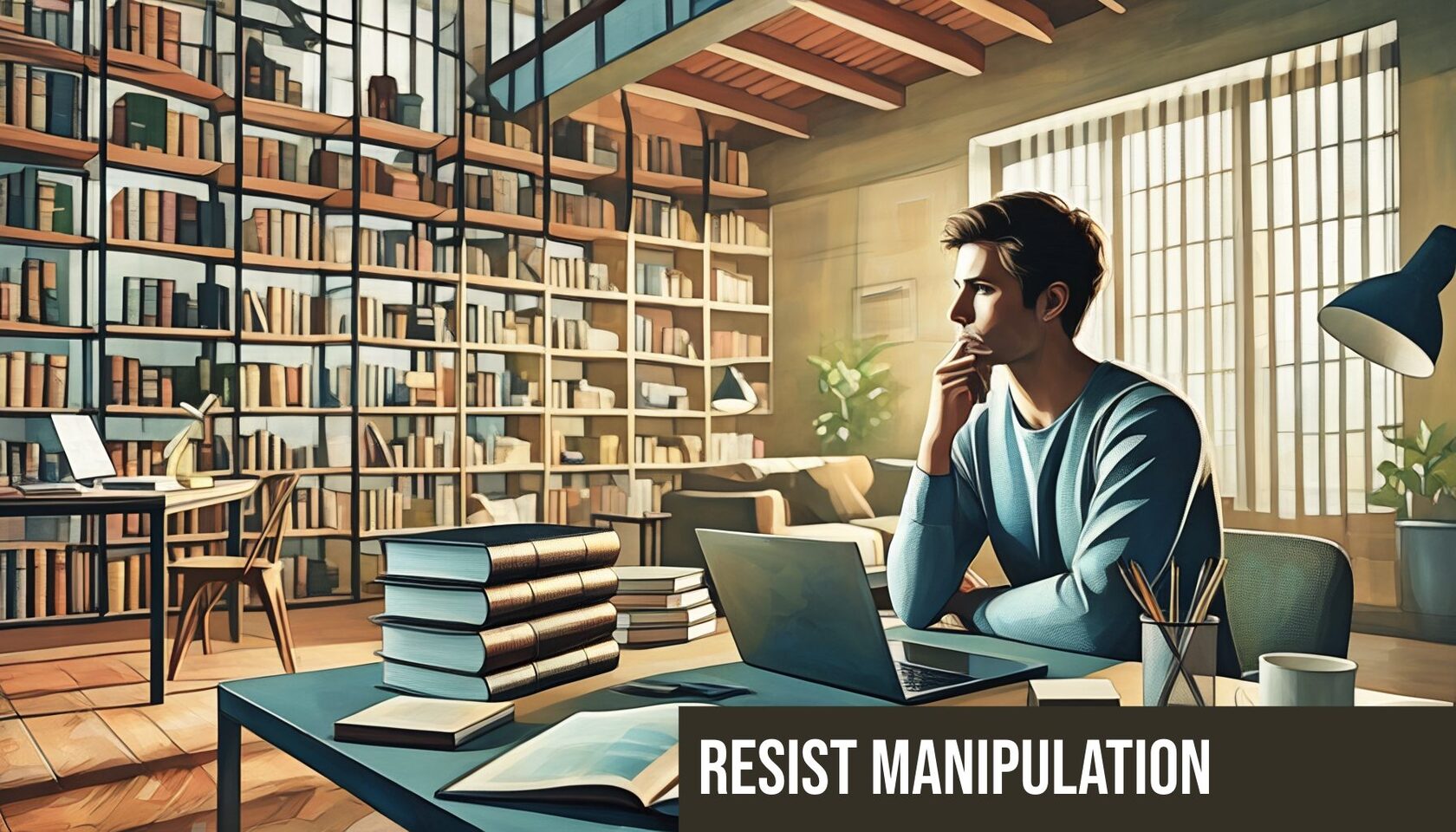Critical Thinking Helps Resist Manipulation
How to adapt to an increasingly complex world and accelerating change? Experts recommend developing a critical thinking: we tell you how not to fall for the deception and manipulation of your own brain and other people.
Embracing a growth mindset allows you to adapt to new challenges and seize opportunities. Seeking diverse perspectives, engaging in open-minded discussions, and staying curious can broaden your understanding and help you make more informed decisions.
What’s happening
There are two main trends of the future are increasing complexity and accelerating change. World economies havereached a level where it is impossible to make a progress without introducing new technologies. According to a Tech ProResearch survey, 70% of large companies are developing or already have a digitalization strategy.
Oxford University researchers believe that a half of routine tasks will be automated in 15 to 20 years. PwC’s GlobalTechnology, Jobs and Skills Survey confirms this prediction. More than 53% of specialists are sure that their work will become obsolete or change a lot over the next ten years, 77% of workers will have to retrain or change their profession. Ifit is more profitable to replace people with artificial intelligence, this will definitely be done.
According to a 2018 Fujitsu report, 68% of entrepreneurs around the world see the future of business as human-robotcollaboration. In this work, a person will remain intellectual tasks — the work of the mind, reasoning and analytics. Criticalthinking helps to cope with such work and adapt to an uncertain future.
Scientists opinion:
"Critical thinking can work at the awareness level, at the analytical skill level, and at the professional level. Consistentdevelopment of these levels helps to rationalize perception, makes the surrounding reality not better, but a little clearer, and predictability is the key to psychological comfort. Critical thinking will not help you avoid risks, but it will help youidentify them."
Embracing a growth mindset allows you to adapt to new challenges and seize opportunities. Seeking diverse perspectives, engaging in open-minded discussions, and staying curious can broaden your understanding and help you make more informed decisions.
What’s happening
There are two main trends of the future are increasing complexity and accelerating change. World economies havereached a level where it is impossible to make a progress without introducing new technologies. According to a Tech ProResearch survey, 70% of large companies are developing or already have a digitalization strategy.
Oxford University researchers believe that a half of routine tasks will be automated in 15 to 20 years. PwC’s GlobalTechnology, Jobs and Skills Survey confirms this prediction. More than 53% of specialists are sure that their work will become obsolete or change a lot over the next ten years, 77% of workers will have to retrain or change their profession. Ifit is more profitable to replace people with artificial intelligence, this will definitely be done.
According to a 2018 Fujitsu report, 68% of entrepreneurs around the world see the future of business as human-robotcollaboration. In this work, a person will remain intellectual tasks — the work of the mind, reasoning and analytics. Criticalthinking helps to cope with such work and adapt to an uncertain future.
Scientists opinion:
"Critical thinking can work at the awareness level, at the analytical skill level, and at the professional level. Consistentdevelopment of these levels helps to rationalize perception, makes the surrounding reality not better, but a little clearer, and predictability is the key to psychological comfort. Critical thinking will not help you avoid risks, but it will help youidentify them."

What is critical thinking
Critical thinking is the ability to doubt incoming information and one’s beliefs, to think clearly and rationally, tolook for a logical connection between facts, and to formulate strong arguments. The basis of critical thinking is theability to reason. Critical thinkers ask questions, question ideas and statements, rather than accepting them as truth.
Test your critical thinking by solving the problem:
Some people think that applicants should attach a photo to their resume. This approach has been criticised for allegedly making it easier for more attractive people to get jobs. One study showed that this is not the case — employers, on thecontrary, consider beautiful women to be dumber. The author of the study believes that this attitude is due to the "stupidblonde hypothesis" and recommends that companies apply the Belgian public sector approach of checking resumeswithout a name, gender and photo. So you can choose the right candidate based on his experience and skills.
Is it true that the anonymous screening approach helped eliminate discrimination in the Belgian public sector?
Truth. Rather true. Need more information. Rather a lie. Lie. The correct answer is at the end of the post.
The modern information flow is an endless feed of messages that mixes news, advertising, useful content, andpropaganda. If you believe everything that is written and said, you can be deceived. For example, in the news they writethat, according to an anonymous source, the shares of such and such a company will soon fall in price. If the news turnsout to be unreliable, and you sell shares, you will lose money. All information may not be true. Critical thinking helps torecognize lies, separate facts and opinions.
Technology complicates things. Algorithms and content personalization put us in information bubbles. This is a state inwhich the user sees only the content that he likes.
Algorithms of social networks, search engines and applications analyze preferences, search history, location and otheruser data. A bubble of content appears around us that does not contradict our point of view. This is how we get intointellectual isolation.
So, journalists from the Canadian newspaper Toronto Star in the summer of 2018 checked 1.3 million words publiclyspoken and written by Donald Trump in the first year and a half of his presidency. The newspaper staff found1,972 false statements and 68,928 untruthful words. In 2017, Donald Trump made an average of three false claims perday. Such statements help politicians to get votes, but the choice of the people will be unconscious and unreasonable. Ifvoters are not satisfied with something, they will have to deal with the consequences of the choice themselves.
How to develop critical thinking
Learning critical thinking is not easy. It’s like learning a foreign language — at first everything seems complicated andincomprehensible, but when you understand the logic, it becomes easier.
Scientist opinion:
"In order to learn a foreign language, we are immersed in the language environment as much as possible. For example, with games, learning a language seems like an exciting adventure rather than hard work. With critical thinking techniques, the situation is more advantageous — we are already immersed in an environment in which it is extremely important toapply them. It remains to take the second step — to come up with your own algorithm for developing critical thinkingskills. It can be micro-studies looking for primary sources or games to find more euphemisms in political texts and jargonin TV news. Your task is to take one aspect or technique of critical thinking and work with it in different contexts, tryingto understand all its possibilities.
To develop critical thinking, practice the skill on specific cases. Question the abstracts and arguments of this article, check references to studies or the competence of experts.
Then learn how to work with critical thinking tools:
An expert in the development of critical thinking:
"When working with information, crawl through the text on your stomach — read carefully, listen carefully, look forlogical inconsistencies, learn to recognize manipulations."
Read our article: Why Businesses Rely on Interim Executives for Expertise, Stability, and Rapid Results
Test your critical thinking by solving the problem:
Some people think that applicants should attach a photo to their resume. This approach has been criticised for allegedly making it easier for more attractive people to get jobs. One study showed that this is not the case — employers, on thecontrary, consider beautiful women to be dumber. The author of the study believes that this attitude is due to the "stupidblonde hypothesis" and recommends that companies apply the Belgian public sector approach of checking resumeswithout a name, gender and photo. So you can choose the right candidate based on his experience and skills.
Is it true that the anonymous screening approach helped eliminate discrimination in the Belgian public sector?
Truth. Rather true. Need more information. Rather a lie. Lie. The correct answer is at the end of the post.
The modern information flow is an endless feed of messages that mixes news, advertising, useful content, andpropaganda. If you believe everything that is written and said, you can be deceived. For example, in the news they writethat, according to an anonymous source, the shares of such and such a company will soon fall in price. If the news turnsout to be unreliable, and you sell shares, you will lose money. All information may not be true. Critical thinking helps torecognize lies, separate facts and opinions.
Technology complicates things. Algorithms and content personalization put us in information bubbles. This is a state inwhich the user sees only the content that he likes.
Algorithms of social networks, search engines and applications analyze preferences, search history, location and otheruser data. A bubble of content appears around us that does not contradict our point of view. This is how we get intointellectual isolation.
So, journalists from the Canadian newspaper Toronto Star in the summer of 2018 checked 1.3 million words publiclyspoken and written by Donald Trump in the first year and a half of his presidency. The newspaper staff found1,972 false statements and 68,928 untruthful words. In 2017, Donald Trump made an average of three false claims perday. Such statements help politicians to get votes, but the choice of the people will be unconscious and unreasonable. Ifvoters are not satisfied with something, they will have to deal with the consequences of the choice themselves.
How to develop critical thinking
Learning critical thinking is not easy. It’s like learning a foreign language — at first everything seems complicated andincomprehensible, but when you understand the logic, it becomes easier.
Scientist opinion:
"In order to learn a foreign language, we are immersed in the language environment as much as possible. For example, with games, learning a language seems like an exciting adventure rather than hard work. With critical thinking techniques, the situation is more advantageous — we are already immersed in an environment in which it is extremely important toapply them. It remains to take the second step — to come up with your own algorithm for developing critical thinkingskills. It can be micro-studies looking for primary sources or games to find more euphemisms in political texts and jargonin TV news. Your task is to take one aspect or technique of critical thinking and work with it in different contexts, tryingto understand all its possibilities.
To develop critical thinking, practice the skill on specific cases. Question the abstracts and arguments of this article, check references to studies or the competence of experts.
Then learn how to work with critical thinking tools:
- use information verification techniques;
- take into account cognitive distortions;
- do not fall for errors of argumentation;
- get out of information bubbles.
An expert in the development of critical thinking:
"When working with information, crawl through the text on your stomach — read carefully, listen carefully, look forlogical inconsistencies, learn to recognize manipulations."
Read our article: Why Businesses Rely on Interim Executives for Expertise, Stability, and Rapid Results
Critical Thinking Checklist

To distinguish the truthful and important from "white noise", information must be approached critically. "5W+H" is thebasic technique for checking new data. This is a system of questions with which you should check all incominginformation. The answers will help you understand how much you can trust the source and what decisions should be madebased on this data.
Who
will benefit? suffer? makes a key decision? will be affected the most? have you thought about it too? can give advice? isone of the key players? deserves recognition?
What are
The advantages and disadvantages? other points of view? alternatives? counterarguments? best/worst possible scenarios? most important/minor options? opportunities for positive change? obstacles to our actions?
Where
can you experience this in real life? Do you encounter similar concepts and situations? is it most needed? could this be aproblem? find more information? get help? will this work? are there areas for improvement?
When
is this acceptable/unacceptable? will it benefit society? will this cause problems? the best time to act? will the result bevisible? did it play a role in the story? expect changes? should I ask for help?
How
does it correlate with similar data? can this affect? did we get this information? find a safe approach? does it helpus/others? does it harm us/others? it might look like in the future? use it to our advantage?
Why
This is problem? is it important to me/others? is this the best/worst case scenario? does it affect people? should peopleknow about it? has it been unchanged for so long? did we let it happen?
Why is it important to verify information?
According to the World Economic Forum, critical thinking is one of the ten most important and in-demand skills by2025. To solve complex ethical, economic and environmental problems in the future, you need to learn how to work with information and your own thinking now. Reasons to use complete and correct data.
"Checking the information is important in order not to be misled and spread it further. Delusions can do real harm: sowpanic, undermine trust, provoke unrest. Of course, no one can force a person who consciously accepts a delusion to checkthe information. This is everyone’s personal choice. It is important to understand that you can become a source of fakesand manipulations. To live in error is one responsibility, but to become a source of them is another."
However, critical thinking is not a panacea. Not a one-stop shop against fake news, disinformation, and fallacies ofreasoning. Critical thinking creates a framework for reflection that will help you deal with uncertainty in thefuture.
The correct answer to the puzzle is: there is no information in the text about the effectiveness of the Belgian approach, sowe cannot say for sure. We need more information to draw a conclusion.
Who
will benefit? suffer? makes a key decision? will be affected the most? have you thought about it too? can give advice? isone of the key players? deserves recognition?
What are
The advantages and disadvantages? other points of view? alternatives? counterarguments? best/worst possible scenarios? most important/minor options? opportunities for positive change? obstacles to our actions?
Where
can you experience this in real life? Do you encounter similar concepts and situations? is it most needed? could this be aproblem? find more information? get help? will this work? are there areas for improvement?
When
is this acceptable/unacceptable? will it benefit society? will this cause problems? the best time to act? will the result bevisible? did it play a role in the story? expect changes? should I ask for help?
How
does it correlate with similar data? can this affect? did we get this information? find a safe approach? does it helpus/others? does it harm us/others? it might look like in the future? use it to our advantage?
Why
This is problem? is it important to me/others? is this the best/worst case scenario? does it affect people? should peopleknow about it? has it been unchanged for so long? did we let it happen?
Why is it important to verify information?
According to the World Economic Forum, critical thinking is one of the ten most important and in-demand skills by2025. To solve complex ethical, economic and environmental problems in the future, you need to learn how to work with information and your own thinking now. Reasons to use complete and correct data.
"Checking the information is important in order not to be misled and spread it further. Delusions can do real harm: sowpanic, undermine trust, provoke unrest. Of course, no one can force a person who consciously accepts a delusion to checkthe information. This is everyone’s personal choice. It is important to understand that you can become a source of fakesand manipulations. To live in error is one responsibility, but to become a source of them is another."
However, critical thinking is not a panacea. Not a one-stop shop against fake news, disinformation, and fallacies ofreasoning. Critical thinking creates a framework for reflection that will help you deal with uncertainty in thefuture.
The correct answer to the puzzle is: there is no information in the text about the effectiveness of the Belgian approach, sowe cannot say for sure. We need more information to draw a conclusion.
Rethinking Recruitment: How UnitiQ Uses Critical Thinking to Elevate Hiring Strategies
Navigating today’s recruitment landscape feels a lot like dealing with the overwhelming flow of information—complex, fast-paced, and full of potential pitfalls. At UnitiQ, we’ve seen how recruitment outsourcing acts like a critical thinking tool for companies, cutting through the confusion and focusing on what truly matters.
Much like the process of questioning every bit of data before drawing conclusions, outsourcing recruitment allows businesses to rethink their hiring strategies, filter out biases, and sidestep the traps of conventional thinking. It’s not just about filling roles but about challenging assumptions and adapting to a constantly changing market with agility. In a world where making the wrong hiring choice can ripple through a company’s success, having a strategic recruitment partner is crucial - it’s the edge that separates companies that merely survive from those that thrive.
Much like the process of questioning every bit of data before drawing conclusions, outsourcing recruitment allows businesses to rethink their hiring strategies, filter out biases, and sidestep the traps of conventional thinking. It’s not just about filling roles but about challenging assumptions and adapting to a constantly changing market with agility. In a world where making the wrong hiring choice can ripple through a company’s success, having a strategic recruitment partner is crucial - it’s the edge that separates companies that merely survive from those that thrive.

Cutting Through the Noise: How Critical Thinking and Talent Outsourcing Drive Strategic Hiring
As I reflect on the complexities of today’s world, it’s clear that critical thinking plays a crucial role not only in resisting manipulation but also in making strategic business decisions, such as selecting the right talent. I’ve seen firsthand how talent acquisition outsourcing can transform a company’s approach to hiring. In an era where rapid changes and information overload can cloud judgment, relying on a specialized partner for talent acquisition ensures that decisions are guided by data, expertise, and clear strategy, not just gut feelings or outdated practices.
At UnitiQ, we help companies cut through the noise and focus on what truly matters—finding people who bring real value and align with your strategic vision, especially when the stakes are high and the traditional methods simply aren’t enough.
At UnitiQ, we help companies cut through the noise and focus on what truly matters—finding people who bring real value and align with your strategic vision, especially when the stakes are high and the traditional methods simply aren’t enough.
Are you looking for excellence in Talent Acquisition and Building Strong Teams?
I’m excited to help you attract the right talent and develop a people strategy tailored to your team’s unique needs. Feel free to ask any questions, and don't hesitate to book a call!
Direct contacts of Olga Fedoseeva, Founder at UnitiQ:
My Telegram
My LinkedIn
Direct contacts of Olga Fedoseeva, Founder at UnitiQ:
My Telegram
My LinkedIn








